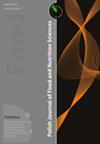Encapsulation of Lactiplantibacillus plantarum and Beetroot Extract with Alginate and Effect of Capsules on Rheological Properties and Stability of an Oil-in-Water Emulsion Model Food
IF 2.3
4区 农林科学
Q3 FOOD SCIENCE & TECHNOLOGY
引用次数: 0
Abstract
Alginate encapsulation is a viable alternative for the preservation of probiotics along the gastric route or within a food product during its shelf life. Furthermore, co-encapsulation with a vegetal material could act as a prebiotic and enhance the viability of the encapsulated probiotic. The rheological properties of dressing-type foods could be altered by adding an ingredient that would affect the quality of the final product. In this investigation, alginate beads loaded with Lactiplantibacillus plantarum and beetroot extract were obtained by two methods (emulsification and extrusion). They were characterized by size and morphology, encapsulation efficiency, and bacteria viability under simulated gastrointestinal conditions. Finally, they were added in an oil-in-water emulsion model food for which rheological properties and probiotic survival were monitored. The encapsulation efficiency ranged from 86.4 to 88%. Morphology and size of capsules varied depending on the method of encapsulation applied. No significant changes were evidenced in the rheological properties of the model food; the viscosity, the particle size (d 3,2 ), and the coalescence rate remained stable after the addition of the capsules. Survival of L. plantarum was significantly higher in the capsules with beetroot extract. These results suggest a prebiotic effect conferred by the beetroot extract when co-encapsulated. It is worth mentioning that the incorporation of capsules with beetroot extract does not cause any destabilization of the model food.海藻酸盐对植物乳杆菌和甜菜根提取物的包封及其对水包油乳化模型食品流变学特性和稳定性的影响
海藻酸盐包封是一种可行的替代益生菌保存沿胃路线或在其保质期内的食品产品。此外,与植物材料共包封可以作为益生元,提高被包封益生菌的生存能力。调味类食品的流变特性可以通过添加一种影响最终产品质量的成分来改变。本研究采用乳化和挤压两种方法制备了植物乳杆菌和甜菜根提取物负载藻酸盐微球。在模拟胃肠道条件下,对它们的大小、形态、包封效率和细菌活力进行了表征。最后,将它们添加到水包油乳液模型食品中,监测其流变学特性和益生菌存活情况。包封率为86.4 ~ 88%。胶囊的形态和大小取决于所采用的包封方法。模型食品的流变性能无明显变化;加入胶囊后,黏度、粒径(d3,2)和聚结速率保持稳定。甜菜根提取物胶囊可显著提高植物乳杆菌的存活率。这些结果表明,当甜菜根提取物被共封装时,具有益生元效应。值得一提的是,胶囊与甜菜根提取物的合并不会导致模型食品的任何不稳定。
本文章由计算机程序翻译,如有差异,请以英文原文为准。
求助全文
约1分钟内获得全文
求助全文
来源期刊

Polish Journal of Food and Nutrition Sciences
FOOD SCIENCE & TECHNOLOGY-
CiteScore
4.30
自引率
12.50%
发文量
25
审稿时长
20 weeks
期刊介绍:
The Polish Journal of Food and Nutrition Sciences publishes original, basic and applied papers, reviews and short communications on fundamental and applied food research in the following Sections:
-Food Technology:
Innovative technology of food development including biotechnological and microbiological aspects
Effects of processing on food composition and nutritional value
-Food Chemistry:
Bioactive constituents of foods
Chemistry relating to major and minor components of food
Analytical methods
-Food Quality and Functionality:
Sensory methodologies
Functional properties of food
Food physics
Quality, storage and safety of food
-Nutritional Research Section:
Nutritional studies relating to major and minor components of food (excluding works related to questionnaire
surveys)
-“News” section:
Announcements of congresses
Miscellanea
 求助内容:
求助内容: 应助结果提醒方式:
应助结果提醒方式:


